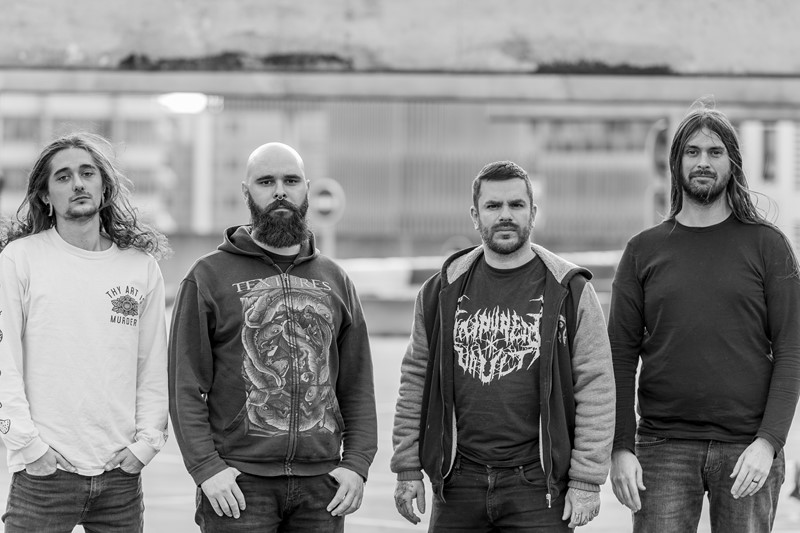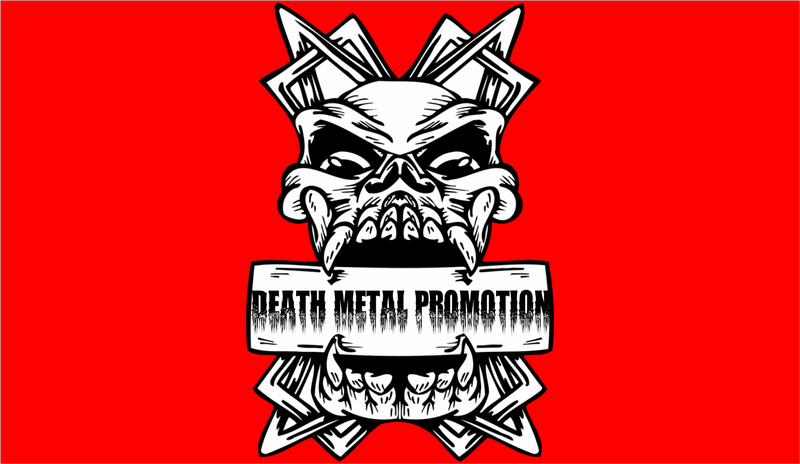
How did the creative process for “Legend” differ from your previous albums, considering your evolution as musicians and as a band?
We still have the same process, we start with a global idea of the concept and a draft of riffs then we look for the artwork. From the artwork, Sylvain starts the real process of songwriting and I start the writing the lyrics. We still have a lot of inspiration from the artwork. After 6 albums, all recorded and mixed by Sylvain, we have now since around 3 albums our own recipe. But yes we are, as musicians, in constant evolution thanks to research work and the influence of what we are listening to. Also, we always want to go further in terms of sound, techniques and creativity.
In what ways do you feel “Legend” represents a milestone in EXOCRINE’s musical journey?
In the first place, this is our most personal album both musically and by the subjects covered. We also think that this time the mix between brutality, technicality and melodic parts is really better. Our previous album is pretty dense, so this time we have decided to put more air in the songs, more calm parts to offer a larger range of emotion.
Could you elaborate on any specific themes or concepts that inspired the songs on “Legend”?
The three characters in this album bring three different points of view of humanity at different scales. They embody the questions I’m asking myself about it, like how we will react in dramatic situations like what is actually happening in the world. But it is also about the place of humans on earth, in the universe and in nature. Are we so important ? The themes in Legend are the most personal that have been covered in Exocrine discography.
Technical death metal is known for its complex compositions. How do you balance complexity with accessibility when crafting your music?
Of course the technical side could be a wall to cross, so we have a particular attention to the relief in the songs. They have to be a journey, we like to put a cinematographic side in our music where riffs describe different scenes. We also tried to mix the prog side with catchy riffs and chorus.
Can you share any memorable anecdotes or challenges faced during the recording process of “Legend”?
I remember one about the song “Dust in the Naught”. I had just arrived at Sylvain’s studio for vocal recording and he was pretty excited. He said “Man, I have a crazy idea. Why don’t we finish the song with Depeche Mode-like vocals and synths ?”. I answered him, “I was actually just listening to them in my car on the way ! Let’s do that !”. That’s how we built the end of this song !
“Legend” is being hailed as a masterpiece even before its release. How do you handle the weight of expectations from both fans and critics?
It’s of course always a source of stress, but we are not particularly afraid of the fans and critics’ reactions. We read every critic and every comment and I think that we have now enough maturity to not take things to heart. The small part of negative comments were able to hurt us before, but now looking back there are always a lot of contradictions in the comments. You can’t please everybody and it’s fine like that.
How does the artwork reflect the themes and emotions conveyed in your music?
Most of the songwriting is done after the reception of the artwork. It is a part of our influences. You can see this giant antagonist who puts the world in flames and I think that Armaada Art has transcribed very well the feeling of weakness that we could feel in front of this creature. Something ineluctable.
How do you view the evolution of the genre over the years, and where do you see it heading in the future?
I think that, like some of the other genres, technical death metal is melting with other subgenres over the years and that’s why it’s becoming more and more popular. It’s maybe because by definition this genre is always trying to push the boundaries of itself. We can actually see different genres becoming more technical. For the future, I hope that this genre will be less of a niche genre without losing its essence.
How do you ensure that each twist and turn in your compositions serves the overall narrative of the song?
Sylvain’s way of songwriting is pretty close to what you can find in cinema music. There are different scenes in a song like there are in the movies: there are action scenes and also contemplative scenes. After that, we decide the placement of the vocals and then it’s just like a filling in the gaps. It is easier this way to make the storytelling match with the song.
“Legend” marks another chapter in your storied career. What legacy do you hope to leave behind with this album?
I don’t know if we can pretend to leave a legacy, but I hope that we’ve shown that it’s possible to mix different genres and subgenres while staying extreme, that it’s possible to explore diverse horizons while keeping true to our roots.
The title “Legend” suggests a certain mythic quality. Are there any mythological or folklore elements that inspired the album’s concept?
We chose this title because for us it’s an invitation to explore our past and looking for lessons about inspiring things or on the contrary the mistakes. To be honest it’s more Warhammer 40k or the science fiction in general that influence us, however these epic stories can of course look like the mythical tales and are undoubtedly inspired by human mythology.
What role do lyrics play in EXOCRINE’s music, and how do they complement the intricate instrumentation?
All our albums are concept albums that link together. We like to see every song like an episode of a season. The recurring characters have for example a theme that could follow them along the story illustrated through the leads like in movies. That’s why the composition is a constant round trip between the musical songwriting and the lyric writing. The first main structure of a song influences the lyrics and after that the lyrics influence the leads and samples for example.
As musicians who have achieved international recognition, how do you stay grounded and connected to your roots in Bordeaux?
Because it’s the cradle of the band, it’s always a great pleasure to play in Bordeaux. We are very proud of our roots so we try to be present on the local scene even if the pandemic has been a heavy blow.
What moments or achievements stand out to you as particularly defining in your journey so far?
Playing at the Hellfest and the Motocultor Festival the same year is undoubtedly one of our greatest achievements. Hellfest is one of the biggest metal festivals in the world, and it’s the equivalent of Disneyland for metalheads in France so it sounds like a consecration for us. Having signed with Season of Mist is also a turning point for us, it feels like a proof of recognition of our work.
In what ways do you hope “Legend” will challenge listeners’ perceptions of what technical death metal can achieve?
I hope that people can see that this kind of extreme music is not as unaffordable than it seems. In this mix of technicality, brutality and speed, you can also have a journey through several emotions. Tech death has a complex origin, but it can still evolve while not turning its back to its roots. Many bands of this scene bring a prog side in their music and that opens a gate to infinite possibilities, it’s in constant evolution.
If you really would like to support Antichrist, you can just Share our article.
You can also support Antichrist by sending a couple bucks to cover some webhosting expenses. =>> PayPal



